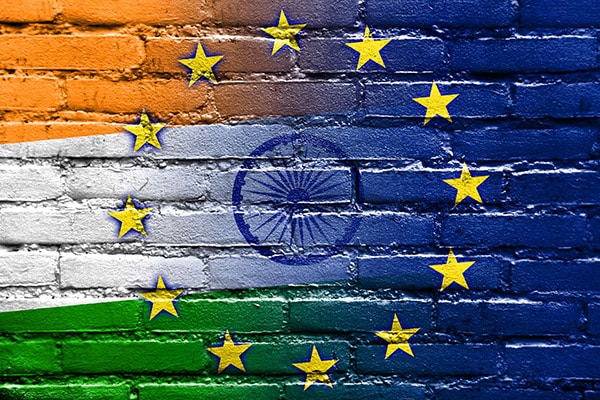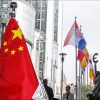
At the beginning of this month, I had the privilege to be invited to New Delhi (my first time ever) to attend a meeting of European and Indian think tanks on the topic: “EU and India: closer partners in global governance?” The event was organized by the EU-Asia Centre and the European Policy Centre and financed by the Friedrich Ebert Stiftung and the EU Delegation in India. The gathering was part of recent EU diplomatic efforts to strengthen ties between European and Indian think tanks so as to revitalize –and fill with content– the very limited political dialogue that exists between the EU and India. In fact, since 2004 there is a strategic partnership between the two, on paper, but the truth is that the relationship is so cold that there has not been a high level summit since 2012.
The EU-India relationship is in part so distant because neither the EU nor India have paid much attention to each other. Unfortunately, there are still too few European businessmen, diplomats, scholars and think tankers who have diverted their attention away from the Atlantic towards Asia, and those who have, focus mostly on China –me included (and, to be honest, we have already our hands full trying to analyze the Middle Kingdom). India, by contrast, is understudied and misunderstood. It is somehow striking, but after the event I had the sense that we Europeans are still trying to discover how India actually works. Perhaps the Brits have a deeper understanding, being India a former colony, but the rest of the Europeans know very little about India (in Spain coverage of India is almost non-existent). I am the first to recognize that I have spent too little time on a country that is part of the BRICS, hosts around 1.3 billion people and for many has more growth potential than China, but the most worrying thing is that there are not that many India experts in Europe at all.
Indeed, both the EU and India are so much focused on their internal problems that they do not have time to engage with the rest of the world. The EU is going from one crisis to another because there is no political union. The Eurozone crisis, the Ukraine crisis, the refugee crisis, the ISIS crisis… Europe is so inward-looking and the EU so divided in dealing with internal problems that one Indian participant from Bombay declared that for most Indians, even business people, the EU does not exist at all. They might think of Germany, France, the UK and perhaps Italy. But the EU is an “unidentified (declining) object”. On the other side, it happens that the Indians have their hands full with internal issues too. They are inward-looking as well. Like the Europeans, they are a proud millennial civilization that through globalisation is experiencing massive transformations. With the arrival of Narendra Modi to power there is great excitement about pursuing structural reforms. India is still a very poor country (per capita income is around $5.000) with a lot of inequality. Hence, there is still a lot of work to do at home. From the perspective of Delhi, China can afford to study and understand the EU and spend political and financial capital (in the form of investments) in the Old Continent. India is not there yet.
So the main conclusion from my trip is that both the EU and India need first to get to know each other better before they can identify common interests. As a corollary, until a certain level of understanding is achieved, the strategic partnership will be hollow. Our Indian counterparts, for instance, told us that the relationship remains too asymmetric, and until the EU does not recognize that and offers more concessions, a free trade agreement will not be in the cards. Indian companies can just not compete on a level playing field with the European ones. They have certainly a point, although one wonders whether protecting India from foreign competition is the best solution. Economic history shows that countries that have opened up (see China, but also Spain, which was closed 40 years ago), have done better than those that have remained closed. Of course, despite the overall benefits, in any free trade agreement there are winners and losers and it is the political authorities that need to redistribute the newly generated growth. Whether the Indian political system is capable to do so is a much bigger question that won’t be resolved any time soon.
If the free trade agreement is a long way off, what can India and the EU do in the meantime? Perhaps the best advice is to forget about grand strategies around global governance and focus on smaller things. First of all, the joint action plan agreed in 2005 should be revised. It is now 10 years old. The new one should prioritize on the things-to–do. The 2005 list is just too long. It seems that collaboration in science and technology is strong. This part should be strengthened. Related to that there are also shared interests in environmental protection (New Delhi has now worse air than Beijing, I suffered it) so getting clean air and water and building smart cities should be a joint priority. The same goes for non-traditional security (including cybersecurity). The EU is not a security actor, so forget about that, for now.
When it comes to more geostrategic, geopolitical questions, EU and Indian think tanks can certainly focus on two research areas that I have noticed are of shared interest: 1) is US power declining, and if so, what are the implications both for India and the EU? And 2) what do we make of China’s “One Belt One Road” (OBOR) Initiative? Will it change Asia and Europe? On these topics (and others) I am looking forward to continuing working with my Indian colleagues –this would be a good way to get to know each other better.


